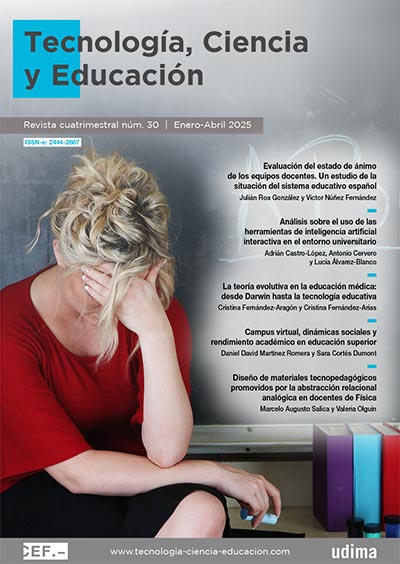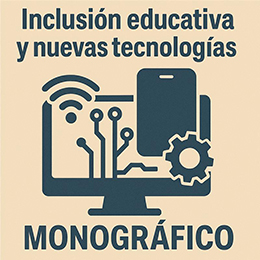The evolutionary theory in medical education: from Darwin to educational technology
DOI:
https://doi.org/10.51302/tce.2025.22213Keywords:
scientific competence, challenge-based learning, global competence, «One Health» approach, gamification, educational escape room, evolutionary medicine, active learning methodologiesAbstract
The theory of evolution is a fundamental principle in the life sciences. However, more than a century and a half after the publication of Charles Darwin's On the Origin of Species, medicine has yet to integrate these evolutionary principles into daily practice or medical training. This work proposes an educational experience aimed at promoting evolutionary literacy among Medical students while fostering essential 21st-century skills, such as scientific, global, and digital competencies. The proposal is based on a thorough analysis of students' alternative conceptions and is enriched with innovative elements offered by educational technologies. It addresses relevant medical issues –such as antibiotic resistance, the emergence of zoonotic diseases, and the evolution of human populations in response to pathogens– from a global perspective like that of «One Health». The initial diagnosis reveals gaps in knowledge and acceptance of certain aspects of evolutionary theory. After implementing the educational proposal, an improvement in this knowledge and an increase in interest and motivation regarding the addressed topics were observed. This highlights the potential of active methodologies and educational technology as drivers of learning, an aspect that deserves more attention within higher education scenarios.
Supporting Agencies
Este trabajo se ha realizado en el marco de un proyecto de innovación financiado en la IV Convocatoria de Ayudas a Proyectos de Innovación Educativa de la UDIMA (ID-UDIMA-2023-02).
Downloads
References
Alba, N. de y Porlán, R. (2017). La metodología de enseñanza. En R. Porlán (Coord.), Enseñanza universitaria: cómo mejorarla (pp. 37-54). Morata.
Beniermann, A. (2019). Evolution-von Akzeptanz und Zweifeln: Empirische Studien über Einstellungen zu Evolution und Bewusstsein. Springer Spektrum. https://doi.org/10.1007/978-3-658-24105-6.
Beniermann, A., Kuschmierz, P., Pinxten, A., Aivelo, T., Bohlin, G., Brennecke, J. S., Cebesoy, U. B., CvetkoviĆ, D., Ðor đeviĆ, M., DvoĆřá-ková, R. M., Futo, M., Geamana, N., Korfiatis, K., Lendvai, A., Mogias, A., Paolucci, S., Petersson, M., Pietrzak, B., Porozovs, J., ... y Graf, D. (2021). Evolution Education Questionnaire on Acceptance and Knowledge (EEQ)-Standardised and Ready-to-Use Protocols to Measure Acceptance of Evolution and Knowledge about Evolution in an International Context. Zenodo. https://doi.org/10.5281/zenodo.4554742
Benton, M. L., Abraham, A., LaBella, A. L., Abbot, P., Rokas, A. y Capra, J. A. (2021). The influence of evolutionary history on human health and disease. Nature Review Genetics, 22, 269-283. https://doi.org/10.1038/s41576-020-00305-9
Bilbao-Quintana, N., Romero-Andonegui, A., Portillo-Berasaluce, J. y López-de-la-Serna, A. (2022). Escape room digital para el desarrollo del aprendizaje colaborativo en educación superior. Education in the Knowledge Society (EKS), 23, 1-14. https://doi.org/10.14201/eks27126
Bland, J. (2004). Teaching statistics to medical students using problem-based learning: the australian experience. BMC Medical Education, 4. https://doi.org/10.1186/1472-6920-4-31
Cañal, P. (Coord.). (2011). Didáctica de la biología y la geología. Graó.
Casado-Ledesma, L., Cuevas, I. y Martín, E. (2023). Learning science through argumentative synthesis writing and deliberative dialogues: a comprehensive and effective methodology in secondary education. Reading and Writing, 36, 965-996. https://doi.org/10.1007/s11145-021-10191-0
Chen, J. y Liang, M. (2022). Play hard, study hard? The influence of gamification on students' study engagement. Frontiers in Psychology, 13, 1-9. https://doi.org/10.3389/fpsyg.2022.994700
Cook, D. A. y Artino, A. R. Jr. (2016). Motivation to learn: an overview of contemporary theories. Medical Education, 50(10), 997-1.014. https://doi.org/10.1111/medu.13074
Cruz Velasco, P. H. de la, Poquis Velasquez, E. V., Valle Chavez, R. A., Castañeda Sánchez, M. I. y Sánchez Anastacio, K. R. (2022). Aprendizaje basado en retos en la educación superior: una revisión bibliográfica. Horizontes: Revista de Investigación en Ciencias de la Educación, 6(25), 1.409-1.421. https://doi.org/10.33996/revistahorizontes.v6i25.422
Delgado-Quiñones, E. G., Rivero-López, C. A., Orozco-Sandoval, R., Sahagún-Cuevas, M. N., Silva-Luna, Z. E. N. y López-Cázares, D. A. (2022). Aprendizaje basado en juegos: propuesta de técnica-enseñanza en médicos becarios. Revista de Medicina del Instituto Mexicano del Seguro Social, 60(1), 19-25. https://pesquisa.bvsalud.org/portal/resource/pt/biblio-1359779
Domènech Girbau, M. y Lope Pastor S. (2009). Propuesta de actividades de aula sobre evolución: otros prismas y contextos. Enseñanza de las Ciencias: Revista de Investigación y Experiencias Didácticas, 1, 1.148-1.153.
Friedrichsen, P. J., Brown, L. G. y Schul, J. (2018). Project teach evolution: preparing biology pre-service teachers to teach evolution in Missouri, U.S.A. En H. Deniz y L. A. Borgerding (Eds.), Evolution Education Around the Globe. Springer International.
Gallagher, S. E. y Savage, T. (2023). Challenge-based learning in higher education: an exploratory literature review. Teaching in Higher Education, 28(6), 1.135-1.157. https://doi.org/10.1080/13562517.2020.1863354
Gefaell, J., Prieto, T., Abdelaziz, M., Álvarez, I., Antón, J., Arroyo, J., Bella J. L., Botella M., Bugallo, A., Claramonte V., Gijón, J., Lizarte, E., Maroto, R. M., Megías, M, Milá, B., Ramón, C., Vila, M. y Rolán-Alvarez, E. (2020). Acceptance and knowledge of evolutionary theory among third-year university students in Spain. PLOS ONE, 15(9). https://doi.org/10.1371/journal.pone.0238345
Glaze, A. L. y Goldston, M. J. (2015). U.S. science teaching and learning of evolution: a critical review of the literature 2000-2014. Science Education, 99(3), 500-518.
Gomollón, F. (2011). La medicina desde la perspectiva evolutiva. GH Continuada, 10(4), 191-195.
González Galli, L., Pérez, G. y Gómez Galindo, A. A. (2020). The self-regulation of teleological thinking in natural selection learning. Evolution: Education and Outreach, 13(6). https://doi.org/10.1186/s12052-020-00120-0
Graves, J. L., Reiber, C., Thanukos, A., Hurtado, M. y Wolpaw, T. (2016). Evolutionary science as a method to facilitate higher level thinking and reasoning in medical training. Evolution, Medicine and Public Health, 2016(1), 358-368. https://doi.org/10.1093/EMPH/EOW029
Gregory, T. R. (2009). Understanding natural selection: essential concepts and common misconceptions. Evolution: Education and Outreach, 2,156-175. https://doi.org/10.1007/s12052-009-0128-1
Grunspan, D. Z., Moeller, K. T., Nesse, R. M. y Brownell, S. E. (2019). The state of evolutionary medicine in undergraduate education. Evolutionary Medicine and Public Health, 2019(1), 82-92. https://doi.org/10.1093/emph/eoz012
Harms, U. y Reiss, M. (2019). The present state of evolution education. En U. Harms y M. Reiss (Eds.), Evolution Education: Re-considered (pp. 1-19). Springer.
Heddy, B. C. y Sinatra, G. M. (2013). Transforming misconceptions: using transformative experience to promote positive affect and conceptual change in students learning about biological evolution. Science Education, 97(5), 723-744. https://doi.org/10.1002/sce.21072
Herrada Valverde, R. I. y Baños Navarro, R. (2018). Revisión de experiencias de aprendizaje cooperativo en ciencias experimentales. Campo Abierto: Revista de Educación, 37(2), 157-170. https://dehesa.unex.es:8443/bitstream/10662/8462/1/0213-9529_37_2_157.pdf
Kampourakis, K. (2014). Understanding Evolution. Cambridge University Press.
Kampourakis, K. (2022). Reconsidering the goals of evolution education: defining evolution and evolutionary literacy. Evolution: Education and Outreach, 15, 1-9. https://doi.org/10.1186/s12052-022-00180-4
Khoshnoodifar, M., Ashouri, A. y Taheri, M. (2023). Effectiveness of gamification in enhancing learning and attitudes: a study of statistics education for health school students. Journal of Advances in Medical Education & Professionalism, 11(4), 230-239. https://doi.org/10.30476/JAMP.2023.98953.1817
Kuschmierz, P., Beniermann, A., Bergmann, A., Pinxten, R., Aivelo, T., Berniak‑WoŹny, J., Bohlin, G., Bugallo‑Rodriguez, A., Cardia, P., Barreiras Pinto, B. P., Betul Cebesoy, U., CvetkoviĆ, D., Demarsy, E., Ðor đeviĆ, M. S., Drobniak, S. M., Dubchak, L., Dvořá-ková, R. M., FanČoviČová, J., Fortin, C., ... y Graf, D. (2021). European first-year university students accept evolution but lack substantial knowledge about it: a standardized European cross-country assessment. Evolution: Education and Outreach, 14, 1-22. https://doi.org/10.1186/s12052-021-00158-8
Kuschmierz, P., Beniermann, A. y Graf, D. (2020). Development and evaluation of the knowledge about evolution 2.0 instrument (KAEVO 2.0). International Journal of Science Education, 42(15), 2.601-2.629. https://doi.org/10.1080/09500693.2020.1822561
Li, X., Li, Y. y Wang, W. (2023). Long-lasting conceptual change in science education. Science & Education, 32, 123-168. https://doi.org/10.1007/s11191-021-00288-x
Mardones Cofré, H., Olguín Becerra, B., Aldunate Cuevas, E., Nieto Núñez, P., Gómez Santibáñez, D., Díaz Vergara, C. y González Bravo, P. (2017). Relación entre los conocimientos de naturaleza de la ciencia, de evolución y la aceptación de la teoría evolutiva en profesores de biología luego de un programa de desarrollo profesional. Enseñanza de las Ciencias: Revista de Investigación y Experiencias Didácticas, núm. extra, 2.491-2.496. https://raco.cat/index.php/Ensenanza/article/view/336875
Miller, J., Scott, E. y Okamoto, S. (2006). Public acceptance of evolution. Science, 313, 765-766.
Mindell, D. P. (2007). The Evolving World: Evolution in Everyday Life. Harvard University Press.
Murray, C. J. L., Shunji, K., Sharara, F., Swets-chinski, L., Robles-Aguilar, G., Gray, A., Han, C., Bisignano, C., Rao, P., Wool, E., Johnson, S. C., Browne, A. J., Give-Chipeta, M., Fell, F., Hackett, S., Haines-Woodhouse, G., Kashef, B. H., Kumaran, E. A. P., McManigal, B., ... y Naghavi, M. (2022). Global burden of bacterial antimicrobial resistance in 2019: a systematic analysis. The Lancet, 399(10.325), 629-655. https://doi.org/10.1016/S0140-6736(21)02724-0
Natterson-Horowitz, B., Aktipis, A., Fox, M., Gluckman, P. D., Low, F. M., Mace, R., Read, A. Turner, P. E. y Blumstein, D. T. (2023). The future of evolutionary medicine: sparking innovation in biomedicine and public health. Frontiers in Science, 1. https://doi.org/10.3389/fsci.2023.997136
Nesse, R. M., Bergstrom, C. T., Ellison, P. T., Flier, J. S., Gluckman, P., Govindaraju, D. R., Niethammer, D., Omenn, G. S., Perlman, R. L., Schwartz, M. D., Thomas, M. G., Stearns, S. C. y Valle, D. (2010). Evolution in health and medicine Sackler colloquium: making evolutionary biology a basic science for medicine. Proceedings of the National Academy of Sciences of the United States of America, 107(suplemento 1), 1.800-1.807. https://doi.org/10.1073/pnas.0906224106
OCDE. (2018). Preparing Our Youth for an Inclusive and Sustainable Work. The OCDE PISA Global Competence Framework. OCDE. https://www.oecd.org/content/dam/oecd/en/topics/policy-sub-issues/global-competence/Handbook-PISA-2018-Global-Competence.pdf
OMS. (2021). Resistencia a los antimicrobianos. https://www.who.int/es/news-room/fact-sheets/detail/antimicrobial-resistance
Pérez Vázquez, E., Gilabert Cerdá, A. y Lledó Carreres, A. (2019). Gamificación en la educación universitaria: el uso del escape room como estrategia de aprendizaje. En R. Roig Vila (Coord.), Investigación e innovación en la enseñanza superior (pp. 660-668). Octaedro.
R Core Team. (2022). R: A Language and Environment for Statistical Computing. R Foundation for Statistical Computing, Viena, Austria. https://www.R-project.org/
Ratinho, E. y Martins, C. (2023). The role of gamified learning strategies in student's motivation in high school and higher education: a systematic review. Heliyon, 9(8). https://doi.org/10.1016/j.heliyon.2023.e19033
Real Decreto 822/2021, de 28 de septiembre, por el que se establece la organización de las enseñanzas universitarias y del procedimiento de aseguramiento de su calidad (BOE núm. 233, de 29 de septiembre de 2021). https://www.boe.es/eli/es/rd/2021/09/28/822/con
Robledo Ramón, P., Fidalgo Redondo, R., Arias Gundín, O. y Álvarez Fernández, L. (2015). Percepción de los estudiantes sobre el desarrollo de competencias a través de diferentes metodologías activas. Revista de Investigación Educativa, 33(2), 369-383. https://doi.org/10.6018/rie.33.2.201381
Rubio Pulido, M. (2017). Diseño universal para el aprendizaje, porque todos somos todos. Emtic. https://emtic.educarex.es/224-nuevo-emt/atencion-a-la-diversidad/3020-diseno-universal-para-el-aprendizaje-porque-todos-somos-todos#ejemplos
Xu, M., Luo, Y., Zhang, Y., Xia, R., Qian, H. y Zou, X. (2023). Game-based learning in medical education. Frontiers in Public Health, 11, 1-9. https://doi.org/10.3389/fpubh.2023.1113682
Yousuf, A., Daud, M. A. bin y Nadeem, A. (2011). Awareness and acceptance of evolution and evolutionary medicine among medical students in Pakistan. Evolution: Education and Outreach, 4, 580-588. https://doi.org/10.1007/s12052-011-0376-8
Downloads
Published
Versions
- 2025-01-14 (2)
- 2025-01-10 (1)
How to Cite
Issue
Section
License
Copyright (c) 2024 Cristina Fernández-Aragón, Cristina Fernández-Arias

This work is licensed under a Creative Commons Attribution-NonCommercial-NoDerivatives 4.0 International License.


























